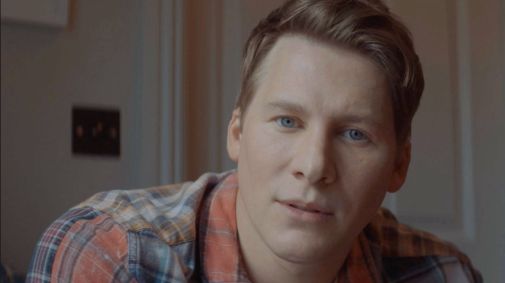By Glenn Dunks

Good intentions can take a movie a long way. Who doesn’t like good intentions?! The problem with good intentions is that they can too often mask deficiencies. And in the case of Mama’s Boy, those good intentions suffocate director Laurent Bouzereau’s ability to tell a story that might venture outside of the lines of the one its subject has a firm and unwavering interest in telling. It’s a lovely story of empathy, compassion, a mother’s love for her son (and vice versa) that nonetheless suffers from rudimentary structure, unadventurous editing, and is built around one talking head interview in particular that lacks spontaneity, as if reciting from a script. Considering it's adapted from a memoir, that probably makes sense.
The central figure here is Academy Award-winning screenwriter and social activist Dustin Lance Black and the film is about him more than the more interesting figure of his mother. Your mileage about that will vary...
Roseanne Bisch was a saint of a woman it would seem. Her life covered a lot of ground that would be ripe for the movie treatment (documentary or otherwise). She survived polio as a child, got impeccable grades, became a renowned scientist for the American military as well as a mother to three sons. She was also a Mormon woman whose devotion to her faith put her in harm’s way with physically abusive husbands and threatened her relationship to the sons that she initially thought were an impossible dream.

Although Bouzereau’s name may be credited, it seems quite obvious that Black is the principal voice here. Others do appear on screen to speak, including Black’s best friend, his husband Olympic diver Tom Daley, and his second step-father Jeffrey. But Black is the one driving the narrative. The image of him winning his Oscar for writing Milk opens the movie, and he remains front and center throughout whether the narrative calls for it or not. There don't even seem to be any publicity stills that aren't of him. It’s honestly distracting. It’s not that the material here is superfluous, it’s more that it just too infrequently looks at the great story within its midst.
Mama’s Boy very quickly becomes a quite flatly pitched biography. Would it not have been more interesting to dive deep into some of the more significant moments of their lives? Bouzereau has a history in home entertainment supplementary material, but also the exceptional Netflix docu-series Five Came Back. The work here is unfortunately too close to the former. Mama’s Boy feels like less of a movie and more of audio book recording without the ability to dig deeper into many of its subject’s fascinating journeys. An early passage about Birsch’s polio diagnosis and her scholastic success is quite something. I’d have loved to hear more. Her experiences with her gay sons is, too—including the tragic death of Todd, Dustin’s older brother hero who strugged with drugs and his sexuality. The look into how the Mormon Church has treated some of its devotees so poorly and how Roseanne pulled herself out from under its cruel thumb and to embrace not just her very open son, but his life as an activist for LGBTIQ+ rights is a lovely final chapter to her life.
Mama’s Boy flies over too much of all this. It’s treated as if a footnote. It’s true that unlike many other subjects of documentaries, there is very little in the way of archival home movie footage, which is always difficult. There are also no recreations, which I am thankful about but another reason why Black is on screen so much. They could only do so much, I suppose. But it becomes somewhat tiresome. Black's story is an interesting one, but as shown here you could be forgiven for being uninspired.
The intentions here with Mama’s Boy are indeed very good. I hope some who are struggling with theirs or a loved one’s convergence of sexuality and religion can see this and find hope. I think there were better ways to have gone about it to have made it a more fitting tribute to a life well, no extraordinarily, led.
Release: Streaming on HBO.
Awards chances: May find success at the Emmys due to its recognisable central figure.